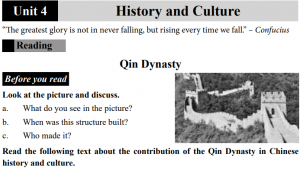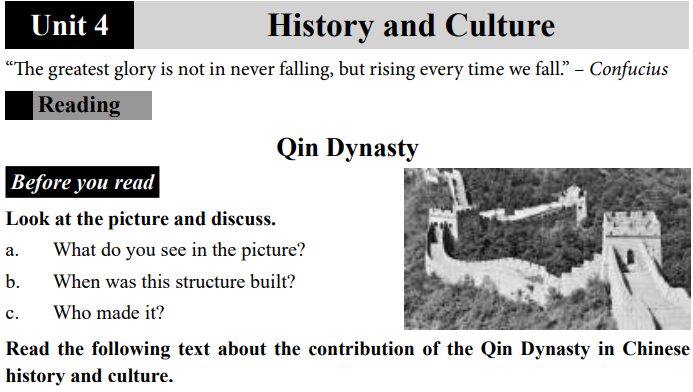Unit 4 History and Culture
Qin Dynasty
Exercise from the Book

Ways with words
A) Match the words with their meanings.
Ans:
| a. brevity | v. lasting only for a short time |
| b. conquest | vii. victory over a place or people by use of military force |
| c. resemblance | i. the state of being alike |
| d. barbarian | ii. a member of an uncivilised group of people or culture |
| e. ally | x. one state united to another by a treaty or a league for a military purpose |
| f. nobility | iii. state of being noble in character, quality, or rank |
| g. ruthlessness | ix. character of having no pity or compassion |
| h. decimation | viii. the killing or destruction of a large number of a population |
| i. harsh | vi. cruel |
| j. elixir | iv. liquid that is believed to cure all ills |
B) Find the following words in the text and use them in sentences of your own.
| Invasion, Disregard, Paramount, populace, revolt, Assassination (murder), Serfdom |
Ans:
a) Invasion (an instance of invading a country or region with an armed force)
Ans: An example of an invasion is a attack on a city.
b) Disregard (pay no attention to; ignore)
Ans: She disregards his advice.
c) Paramount (more important than anything else; supreme.)
Ans: Everyone agrees that social security is the paramount issue.
d) Populace (the people living in a particular country or area.)
Ans: The populace of a nation is its people.
e) Revolt (take violent action)
Ans: A revolt will force the government to listen their voice.
f) Assassination (murder)
Ans: The reporter was in constant fear of assassination.
g) Serfdom (condition in medieval Europe in which a tenant farmer was bound to a hereditary plot of land and to the will of his landlord.)
Ans: The abolition of serfdom is a victory in the history of the world.
D) Consult a dictionary and prepare a list of ten homographs. Page:37
Homographs are the words with different pronunciations and different meanings but same spellings. However, the words here have a change in the word stress often causing changes in the vowel sounds.
Ans:
| 1. bass – type of fish OR low, deep voice |
| 2. bat – piece of sports equipment OR an animal |
| 3. bow – type of knot OR to incline |
| 4. down – a lower place OR soft fluff on a bird |
| 5. entrance – the way in OR to delight |
| 6. evening – smoothing out OR after sunset |
| 7. fine – of good quality OR a levy |
| 8. learned – past tense of learn OR knowledgeable |
| 9. minute – tiny OR unit of time |
| 10. row – line OR argument |
Comprehension (Page:37)
Complete the table with the correct information from the text.
| Qin Dynasty Period | 221-206 BCE |
| Zhou Dynasty Period | 1046-256 BCE |
| Warring States Period | 426-221 BCE |
| Unification of China by Qin | 230 BCE |
| First Emperor of Qin Dynasty | Qin Shi Huang |
| Death of Shi Huangdi | 210 BC |
| Liu Bang Period | 247 BCE-195 BCE |
B. Answer these questions. (Page: 38)
a) Why is the Zhou Age called a feudal age?
Ans: During the Zhou Dynasty, China was never a unified kingdom. The Zhou government bore a strong resemblance to some of the forms of feudalism in medieval Europe, which is why the Zhou age is sometimes referred to as a feudal age.
b) What is the location advantage of the Qin?
Ans: The Qin had the advantage of a favourable location: Its territory in modern Shaanxi Province is well guarded from the east by mountains and gorges and has easy access to the North China plain through the Yellow River passes.
c) What contributed to the success in the warfare as described in the text?
Ans: They were also able to expand their borders without fear of immediate conflict, unlike the other states, and so could obtain still further resources. This benefit, and others such as the size of the Qin army and their expert use of the chariot, contributed to their success in warfare.
d) Why did the Qin invite the foreign advisor, Shang Yang?
Ans: Early in the Qin Empire, the practice of Legalism reached its peak in Chinese history. This idea of state policy was devised by Shang Yang who came to Qin as a foreign advisor. Qin was lacking, early on, in skilled intellectuals and politicians and, therefore, had to look beyond its borders for talented people. Shang Yang was one of those foreign talented persons and he would have a lasting influence on the Qin Empire
e) What were the key features of the Qin political system?
Ans: Fear and control were the key features of this political system. In addition, one’s personal importance to the empire was also a key element. If you, as a person, meant nothing to the state, you actually meant nothing objectively; your life was meaningless.
f) How were the people treated during the Qin Period?
Ans: Farmers were freed from serfdom. The people throughout the empire were now supposed to bear collective responsibility for each other. If a person did not behave according to the rules, then others were required to report to him. If they did not do this, they were quartered or beheaded. Those who contributed the most to the state were highly rewarded while those whose lives were considered of no consequence were sent to work as slaves.
g) Why did Shi Huangdi stop educating ordinary people?
Ans: Shi Huangdi believed that uneducated people were easier to control and so the people should remain stupid so that they would never think to doubt who was in charge of the empire.
h) What did the Qin achieve by the legalism in practice?
Ans: Legalism helped to create a superior army, a disciplined bureaucracy, an obedient populace, and the unquestioned authority of a strong central government.
i) Why did Shi Huangdi never sleep in the same room for two consecutive nights?
Ans: In his later years, Shi Huangdi became obsessed with death and the hope of eternal life. In constant fear of assassination, it is said, he never slept in the same room of his palace two nights consecutively
j) What are the everlasting marks of the Qin Dynasty?
Ans: The Qin Dynasty created the standard of bureaucratic government and the Legalistic policies first initiated by the Qin. In addition, the dynasty left a wonder of ancient artwork: The Terracotta Army in Xi’an. The most famous legacy left by the Qin is The Great Wall of China. The Qin did more than just found a dynasty in China: they brought a continent together.
Critical thinking
A) The Great Wall and the Taj Mahal are the creation of the autocratic rulers. Present your view for or against this statement.
Ans: Yes, I believe that the Great Wall of China and the Taj Mahal are the creation of the autocratic rulers. The Great Wall of China was made to protect the north empire of China from enemy attacks. There are nineteen walls. The first wall was built in the 7th century BC. The famous wall built by Qin Shi Hong (Emperor of China) in 226-200 BC. The current wall was built by Ming Dynasty of China.
It is not possible to make The Great Wall of China by an individual effort. People were forced to such projects by autocratic rulers as a punishment. It is mentioned in the text that people throughout the empire were supposed to bear collective responsibility for each other. If a person did not behave according to the rules, then others were required to report to him. If they did not do this, they were quartered or beheaded. Those who contributed the most to the state were highly rewarded while those whose lives were considered of no consequence were sent to work as slaves on Shi Huangdi’s building projects such as the Great Wall of China, the Grand Canal, and the roads which increased ease of trade and travel.
In the same way, Taj Mahal is also a result of the autocratic ruler of Mughal emperor of India, Shah Jahan. It is believed that he built it to immortalize his wife Mumtaz. It is said that Shah Jahan severed the hands of the artists to prevent them to make same kind of structure again. Historical facts prove that the king was more ruthless than romantic. It took 20 years for 20000 workers to build the Taj Mahal.
All people remember the name of emperors who built the structures but nobody is eager to search the realities behind the structures. It is proven fact that history is always written by the winners.
B) How do you describe the pros and cons of feudalism?
Feudalism
Feudalism is a socio-political system that existed in Europe during the Middle Ages in which people worked and fought for the nobles who gave them protection and the use of land in return. In it, a country is divided into different ruling regions.
Pros of Feudalism/Positive aspects
- Self sufficient- Each ruling region had its own rulers.
- System of co-existence
- A simplistic chain of command- A chain of command moves from the top to bottom. People follow certain nobles.
- Easy land management- Each ruling region sustains itself. Land is managed by working class as well as noble class people of the region.
- Saves common men from the foreign invaders
- End of slavery
Cons of Feudalism/Negative aspects
- Abusive power- Nobles could abuse the power ruthlessly.
- Less trade
- Isolated existence
- Less freedom to people
- Slave-like life of people
- Division of society into two classes: feudal and peasant
Writing
A) Write an email to your friend living abroad stating the contributions of Prithvi Narayan Shah in the unification of Nepal.
Ans:
Subject: Hi!
Dear Friend, Sushil
I am fine here and hope that you are also fine there. I received your email on Sunday morning. You have asked me about the contributions of Prithvi Narayan Shah in the unification of Nepal. I am writing about it in detail.
Prithvi Narayan Shah was born in Gorkha in 1779 BS. He belonged to Shah dynasty. After his father’s death, he became the king of Gorkha. The unification of Nepal was initiated by King Prithvi Narayan Shah in 1799 BS.
He conquered Nuwakot at the beginning. After conquering Nuwakot, he conquered the Kathmandu Valley, Lalitpur and Bhaktapur. He united different warring kingdoms to increase his unification process. After winning over other kingdoms he moved his capital to Kathmandu. He gave a new name “Nepal” to his Gorkha kingdom.
Write soon and tell me all about yourself and family.
Best Wishes,
Suresh
B) The table shows the major political movements in Nepal after the end of the Rana Regime. Write a paragraph of each event with their key contributions in the political landscape of Nepal.
Political Movement Year (AD)
1 Establishment of Democracy 1951
Ans: Nepali people were dissatisfied with Rana Regime. They revolted against it. As a result, King Tribhuvan went to Delhi to do agreement between Ranas, Nepali Congress and King Tribhuvan. In 1951 (15 February) King Tribhuvan and the leaders of the Nepali Congress returned to Kathmandu from India. On 18 February, the King announced Nepal’s first steps to democracy. The cabinet at that time was headed by Sir Mohan Shumsher Jang Bahadur Rana.
2 First General Election 1959
Ans: First general election was held in Nepal from 18 February to 3 April 1959. It elected 109 members of the first House of Representatives, the lower house of the Parliament of Nepal. Forty two percentage of Nepali citizens participated in it. Nepali congress won the election with 74 seats out of 109 seats. It got 38% of total vote. B.P Koirala became the first prime minister of Nepal to be elected democratically.
3. Dismissal of Elected Government 1960
KING Mahendra of Nepal dismissed Prime Minister BP Koirala for raising anti national element in December, 1960. King accused Koirala and Nepali Congress leaders acting as Indian agents. Several leaders were arrested and sent to jail.
4 National Referendum 1980
In Nepal on 2 May 1980 a referendum on the system of government was held. Nepali citizens can choose between panchayat system and a multi-party system. 54.99% of people voted for the panchayat system whereas Multi-Party System only received 45.2%.
5 People’s Movement I 1990
The People’s Movement I 1990 was the movement led by the various political parties of Nepal. It ended both monarchy as well as panchayat system. It began constitutional monarchy.
6 People’s Movement II 2006
The movement is also known as Jana Andolan II. It was against the direct and undemocratic rule of King Gyanendra. King Gyanendra reinstated the old Nepal House of Representatives on April 24, 2006. Girija Prasad Koirala, a leader of Nepali congress, led the government.


28 Comments
buying prescription drugs in mexico online
https://cmqpharma.com/# mexican rx online
medicine in mexico pharmacies
pharmacies in mexico that ship to usa: online mexican pharmacy – mexican pharmaceuticals online
http://indiapharmast.com/# buy prescription drugs from india
reputable mexican pharmacies online: medicine in mexico pharmacies – mexican pharmaceuticals online
reputable indian online pharmacy: п»їlegitimate online pharmacies india – top online pharmacy india
canadian pharmacy 365 pharmacy rx world canada canadian drug pharmacy
https://canadapharmast.com/# pharmacy wholesalers canada
best online pharmacies in mexico: mexican pharmaceuticals online – mexican pharmaceuticals online
mexico drug stores pharmacies п»їbest mexican online pharmacies mexican drugstore online
mexico drug stores pharmacies: best online pharmacies in mexico – medicine in mexico pharmacies
http://indiapharmast.com/# best india pharmacy
mexico drug stores pharmacies: reputable mexican pharmacies online – mexico drug stores pharmacies
mexico pharmacy: buying prescription drugs in mexico – reputable mexican pharmacies online
https://ciprodelivery.pro/# where can i buy cipro online
https://paxloviddelivery.pro/# Paxlovid over the counter
where to buy cheap clomid without rx: how to get generic clomid price – buying cheap clomid without insurance
https://clomiddelivery.pro/# where can i buy generic clomid without insurance
https://amoxildelivery.pro/# amoxicillin 500mg without prescription
Paxlovid buy online: paxlovid buy – paxlovid india
https://clomiddelivery.pro/# where to get cheap clomid for sale
ciprofloxacin mail online: buy ciprofloxacin over the counter – where can i buy cipro online
http://amoxildelivery.pro/# amoxicillin tablets in india
http://amoxildelivery.pro/# amoxicillin 500 mg tablet price
can i purchase cheap clomid without rx: generic clomid pill – buy generic clomid without prescription
https://ciprodelivery.pro/# purchase cipro
http://clomiddelivery.pro/# get cheap clomid for sale
order amoxicillin 500mg: cost of amoxicillin – generic amoxicillin cost
paxlovid covid: Paxlovid over the counter – paxlovid pharmacy